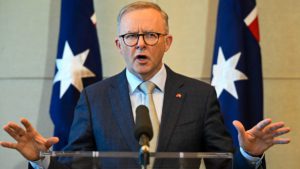One day before world leaders convene in New York to sign the historic Paris climate pact, a major report has questioned the credibility of Australia’s commitment to fight global warming in light of its “race to the bottom” economic strategy of digging up and exporting huge amounts of coal.
The report, released by Greenpeace on Thursday, notes that despite Australia’s commitment under the Paris Agreement to reduce its greenhouse gas emissions by 26-28 per cent from 2005 levels by 2030, its overall contribution to climate change has increased exponentially through its “determined expansion” of fossil fuel exports.

Indeed, the report says, if Australia’s coal exports grow by over 60 per cent, as the Australian government projects, the resulting increase in carbon emissions would erase the benefit of its Paris target nearly seven times over.
This year alone, according to Greenpeace, Australia will export a billion tonnes of CO2 in its coal, which is more than it plans to save domestically between 2020 and 2030.
Taking this – and the Turnbull government’s low-ball climate policy targets – into account, Greenpeace argues that Australia is contravening its international obligation to safeguard the World Heritage-listed Great Barrier Reef, which is currently experiencing its worst coral bleaching event in history because of warming waters.
“Today, Australia’s domestic CO2 emissions are 560 million tonnes – not much higher than in 1990, mainly because reduced land clearing has offset emissions growth. However, coal exports have risen to 400 million tonnes,” the report says.

“As a result, and almost completely unnoticed, 1 billion tonnes of CO2 will be generated offshore by Australian coal this year. This represents a massive increase of 253% in Australian CO2 exports from 1990.
“In the next five years, the emissions Australia exports in coal could overtake the CO2 currently exported in Saudi Arabian oil.”

For that to happen, says the report, just one or two of the larger new coal mines being proposed in Australia would need to be built. And as we know, both state and federal governments look ready to oblige on this count.
“Unlike much of the world,” it says, “Australia’s government is betting on a bright future for coal, not on structural decline. It is working assiduously to prop up the industry and extend its longevity. Australia’s aim is to ride out the downturn, and emerge with an even bigger share (of the market).
“It’s a race to the bottom strategy that depends on selling more coal to developing countries, particularly in Asia, while there is still time. It also depends on some of the largest coal mines in history being built, the emissions consequences of which are staggering.”
Of course, one such mega-mine is Adani’s Carmichael coal project in Queensland’s Galilee Basin, which – against the best economic advice and in the face of the unprecedented threat of climate change – won final approval from the state government at the beginning of this month.
According to Greenpeace, the two largest proposed Australian coal mines – including Carmichael – will generate more carbon emissions offshore than all of Australia’s power stations and cars put together.
The Turnbull government – and the Opposition, for that matter – seems undaunted by this prospect. Rather, one Coalition government member this week went so far as to suggest that the Carmichael mine should be powered by a new 1.2GW coal-fired generator, which could be built using funds from Direct Action and the Clean Energy Finance Corporation.









